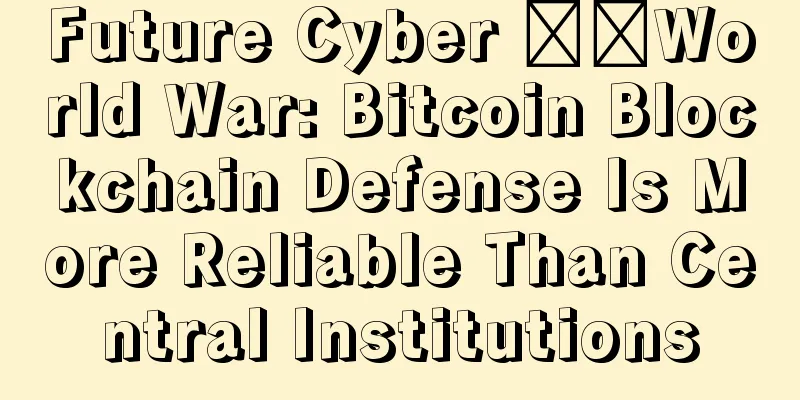Future Cyber World War: Bitcoin Blockchain Defense Is More Reliable Than Central Institutions

|
Cybersecurity has become one of the biggest security threats to many countries, including the United States, the European Union, Russia, and China. An effective large-scale attack could simultaneously disrupt communications, ground military aircraft, or attack civilian infrastructure such as hospitals, power plants, and communications in major cities. Adeolu Fadele, president and founder of the Crypto Development Initiative of Nigeria (CDIN), said:
Perimeter security is unreliableThe existing network security system is full of loopholes. In October 2016, a large-scale distributed denial of service (DDoS) attack hit some well-known websites, such as Twitter, Amazon, and the New York Times, making them inaccessible. This attack did not directly target any of these companies, but targeted Dyn, the DNS service provider for these companies. Fadele told Cointelegraph that the inherent vulnerabilities in current systems are the main reason why perimeter defense has become standard practice. Now that traditional perimeter defenses are no longer able to protect against advanced persistent threats (APTs), the need for an attack-resistant distributed ledger technology (such as the Bitcoin blockchain) has become inevitable. Better chance of survivalGrant Blaisdell from Coinfirm Blockchain Labs believes that blockchain technology can significantly reduce potential losses, because if an attacker wants to successfully attack a blockchain network, they must attack the entire network instead of just one central point. In addition, even if attacked, most infrastructure has a high chance of not being affected.
Governments fear losing controlConsidering why governments might be reluctant to embrace blockchain technology, Blaisdell said it could be due to an irrational fear of losing control. For decades (or even centuries), all governments and public administrations have centralized policy for decision-making and critical infrastructure, a model that is proving to be inefficient and insecure, with thousands of incidents such as email leaks or data theft. A unified blockchain-based system for administration, security, and even the military would significantly reduce the risk of attacks and potential damage. The reliability of BitcoinFadele cited the Bitcoin blockchain as an example of a distributed ledger system that has been running on a public network for eight years without traditional perimeter security. “Bitcoin is now worth more than $14 billion, and no one has been able to hack into it.” He also pointed out some properties of the Bitcoin blockchain that make it a better security defense than traditional perimeter defenses:
However, Fadele believes that some current challenges may be slowing down the mainstream adoption of Bitcoin and blockchain: New and evolving
The second digital revolutionThe digital revolution that began decades ago is still disrupting existing systems and structures. The first generation of digital revolution represented by Internet information has disrupted many institutions, such as printing presses, post offices, libraries and communications. Now the next round of digital revolution has arrived, bringing us the Internet of value, which will change the global financial and economic landscape. |
<<: Although the price of coins is rising, users should also beware of phishing attacks
>>: $43 million worth of Bitcoin, but this company refuses to sell it
Recommend
There are two vertical lines between the eyebrows. What should women with vertical lines between the eyebrows do?
The area between the eyebrows is what people ofte...
When a woman smiles, she gets crow's feet. What do crow's feet mean?
As they age, many women will develop crow's fe...
What do the marks on the palms and fingerprints on the fingers mean?
Various marks will appear on the palm lines. This...
GIB Global Investment Digital Bank (scheduled) global premiere conference will be launched online soon
Crypto financial management, create the future. T...
Cloud Mining Company Argo Introduces New ASIC Servers
Cloud mining company Argo introduces new ASIC ser...
Intel enters Bitcoin mining machine chip market: Using TSMC 5nm chip with energy efficiency ratio of about 35J/T or mining machine mass production in the middle of the year
Wu said the author | Colin Wu Editor of this issu...
Moles on the hands fortune telling is good or bad?
Moles can reveal a person's destiny. Almost e...
What does a mole on a man's left chest mean? Is it good for a man to have a mole in the middle of his chest?
Is it good for a man to have a mole on his chest?...
What is the situation of the disappearance of the career line? Detailed explanation of the career line
There are many lines on everyone's palms. The...
Financial nuclear bombs begin to backfire: global energy and rare metals soar, and the crypto market is in chaos
The impact of the Russian-Ukrainian conflict on t...
What does a woman with a long and straight nose mean?
The appearance of a woman's nose contains too...
Physiognomy analysis: What does a full forehead and a round chin mean?
A full forehead and a square chin is a very good ...
See if you have a good fortune
The pursuit of a rich and prosperous life has bee...
What should I do if I don’t have a wealth line? Does not having a wealth line mean that I will never have any money in my life?
We all have many complex lines on our palms, and ...
Marriage has twists and turns
First: The outer part of the ear is called the wh...









